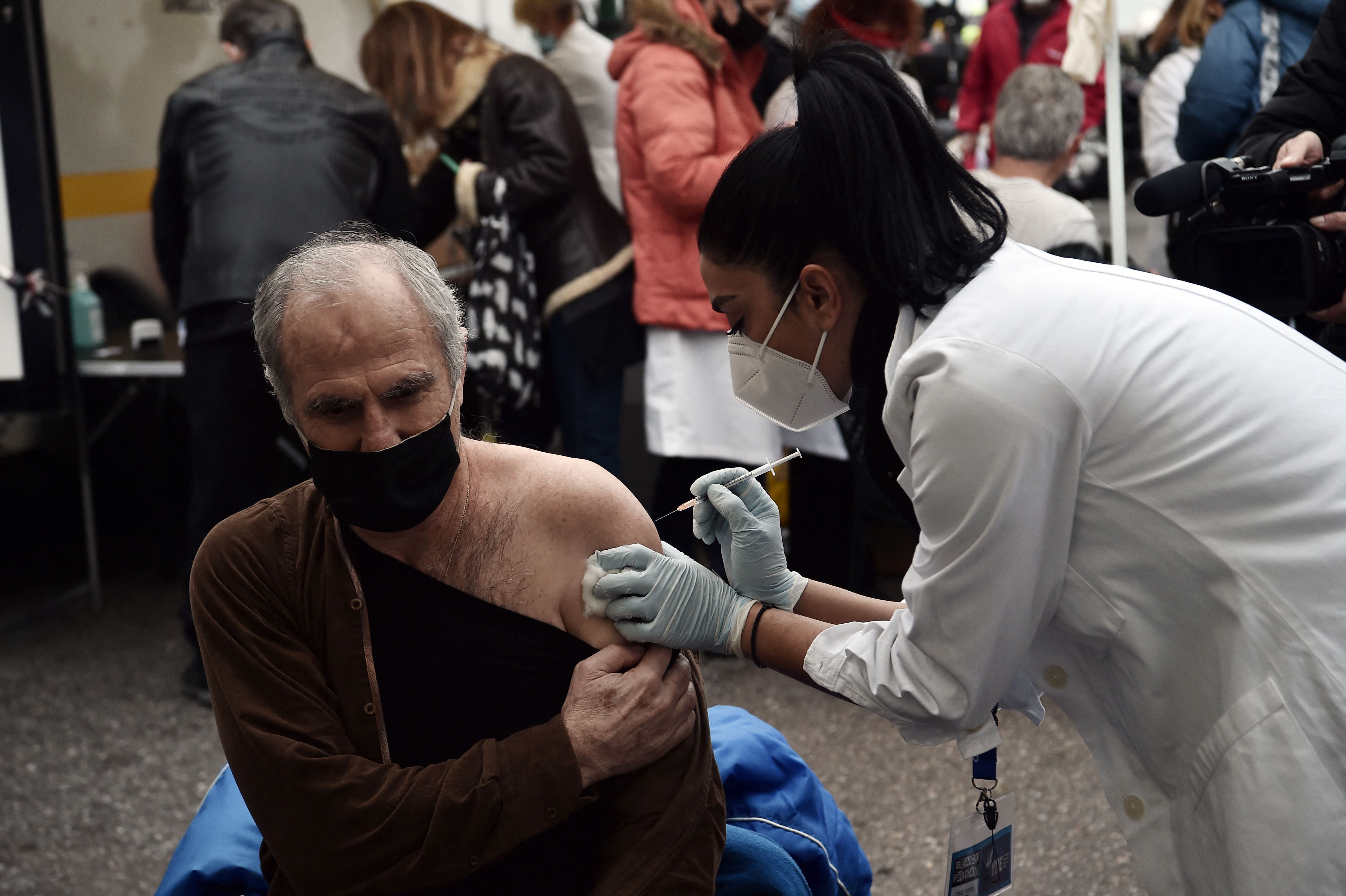A price too high: Elderly Greeks say fines for failing to get Covid vaccine are too costly
Over-60s in Greece who do not get a mandatory vaccine face monthly fines of 100 euros

Your support helps us to tell the story
From reproductive rights to climate change to Big Tech, The Independent is on the ground when the story is developing. Whether it's investigating the financials of Elon Musk's pro-Trump PAC or producing our latest documentary, 'The A Word', which shines a light on the American women fighting for reproductive rights, we know how important it is to parse out the facts from the messaging.
At such a critical moment in US history, we need reporters on the ground. Your donation allows us to keep sending journalists to speak to both sides of the story.
The Independent is trusted by Americans across the entire political spectrum. And unlike many other quality news outlets, we choose not to lock Americans out of our reporting and analysis with paywalls. We believe quality journalism should be available to everyone, paid for by those who can afford it.
Your support makes all the difference.Greece’s drastic decision to make Covid-19 vaccinations mandatory for people aged 60 and over with fines for those who do not comply has sparked frustration among pensioners who say they are already struggling financially.
The announcement from Athens on Tuesday means Greece is the second European country to make vaccinations mandatory, after Austria, although it is the first in the EU to target a specific age group.
Over-60s who have not been vaccinated or made an appointment for their first dose by 16 January will face a monthly fine of 100 euro (£85), with the collected money helping to finance Greece’s hospitals.
Greece has recorded a spike in infections this month, with daily cases hitting record highs, while its full vaccination rate of 63 per cent lags behind the EU average of 66 per cent.
When it comes to people aged 60 and over, just over four-fifths have been vaccinated - a statistic that also compares badly with the rest of the bloc.
Prime Minister Kyriakos Mitsotakis said the decision was a difficult one but essential to protect more than 520,000 elderly Greeks who had not yet been jabbed.
"We are focusing our efforts on protection of our fellow citizens and for this reason their vaccination will be mandatory from now on," he told a cabinet meeting on Tuesday
“(The decision) tortured me, but I feel a heavy responsibility in standing next to those most vulnerable, even if it might fleetingly displease them,” Mitsotakis added. “It’s the price to pay for health.”
Yet several retirees in Athens told The Independent that the price of failing to comply with the measures was unfair given the state of the country’s economy and the modest pensions afforded to retirees.
Greece emerged from a decade-long financial crisis in 2018 but saw its economy slump again by 8.2% last year amid restrictions to curb the spread of Covid-19, which also hurt its vital tourism industry.
“These measures are very bad,” said Agapi Agouridaki, 77, a retiree living in Athens. She has taken three vaccination doses, but believes the fines are an impossible imposition.
“You do not see the misery every person has? Now they must pay? It’s unacceptable.”
The average pension in Greece is about 730 euros a month, while the retirement age can range from 60 to 70 years old.
Eight in 10 retirees in Greece are impoverished and cannot pay for basic living costs such as medicine or electricity, according to 2017 figures from the country’s United Retirement Network.
Nikos Dimitriou, a 69-year-old retiree, has several health problems that prohibit him from getting vaccinated but said he was most worried about the fines.
“People may not have enough to eat. How will they pay? Some could be sick, some could not be able to pay, some this, some that,” he told The Independent. “It is not a correct decision.”
This message was echoed by Syriza, Greece’s main opposition party, which said the measures were punitive and financially excessive.
“The perpetrator of the health disaster … instead of taking responsibility, shifts it once again to the citizens,” the party said in a statement on Tuesday.
Throughout austerity and thereafter, Greece has cut funding from the national health system for over a decade, leaving hospitals struggling to manage the pandemic with shortages of staff and supplies.
“This time it targets those over 60s and instead of announcing national health system support measures, encouraging vaccination and tightening health care measures, it announces punishment and financial extermination measures, which have not been implemented in any other country in the world,” Syriza’s statement said.
Yet not all retirees are against the new measures.
In fact, some see mandatory vaccines as Greece’s only way out of a pandemic that has infected at least 931,180 people and caused about 18,070 deaths in the country to-date.
“(The government) are putting these things to try what they can,” said 63-year-old Roland Zoto, who has received three vaccination doses. “It’s correct what they have done. They study these things, they know better.
“We are of an age now where we are a bit afraid. We know we will die but we don’t want to suffer. I want to die standing up,” he said with a smile.
Join our commenting forum
Join thought-provoking conversations, follow other Independent readers and see their replies
Comments